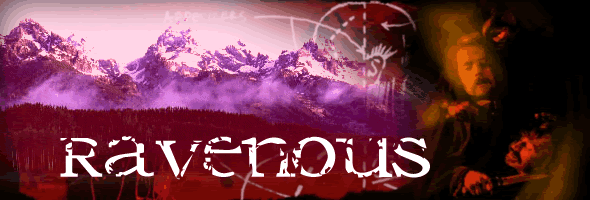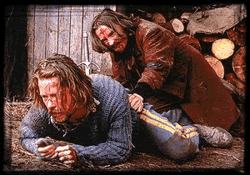
Color, 1999, 100 mins. Directed by Antonia Bird
Starring Guy Pearce, Robert Carlyle, Jeremy Davies, Jeffrey Jones, John Spencer, Stephen Spinella, Neal McDonough, David Arquette / Written by Ted Griffin / Music by Michael Nyman & Damon Albarn / Cinematography by Anthony B. Richmond
Letterboxed (2.35:1) / Dolby Digital 5.1
Format: DVD - Fox (MSRP $34.98)
At first glance, the chilling and blood-drenched Ravenous seems a bizarre choice for British director Antonia Bird, best known to U.S. audiences for her controversial clergy drama, Priest (also with Carlyle, and cut to shreds here by Miramax like most of their other films). However, the troubled production (on which she was the third director) benefited greatly from her talents, as she skillfully builds the story to a nervewracking degree of intensity by the end of the first third. The unappealing trailers and poster art tried to pass this off as an arty gore comedy, but the laughs in Ravenous are dark and sardonic at best, eliciting more sick chuckles than hearty guffaws. Pearce, doing another impressive American accent after L.A. Confidential, and The Full Monty's Carlyle make a dynamic pair of foes and make for a fascinating study in contrasting acting styles. Carlyle's psychopathic performance works especially well and builds up a solid sense of dread even when the man himself is offscreen. The solid supporting cast, including fine bits by Jeremy Davies ("He was licking me!") and Arquette in a glorified cameo, integrate believably into the off-kilter atmosphere without drawing attention to themselves. The beautiful scenery, filmed mostly in Czechoslavakia, doubles nicely for the U.S. wilds, lending a genuine sense of isolation and untamed savagery while perfectly driving home the film's message: European colonialism, most obviously in America, drew its strength entirely from callously feeding off of other human beings. To top it off, Michael Nyman and Blur's Damon Albarn provide a dazzling experimental score that could easily drive mainstream audiences nuts. If this all sounds too heady, have no fear; Ravenous is also a terrific little horror film, packed with shocking violence (especially remarkable considering its R rating) and a number of suspenseful, creepy set pieces. How a film like this managed to get financed and produced by a major U.S. studio remains one of those bizarre little miracles that one should probably accept without any questions.
Originally announced as a feature-only DVD by Fox, the disc was thankfully upgraded to special edition status after protests by the filmmakers and the small but hopefully growing cult of loyal viewers. While most of Fox's DVD output has been severely lacking in quality and stupidly overpriced, Ravenous at least makes some gestures towards justifying the steep price tag. Of course, New Line does the same thing with almost every movie for a lot less, so one can only wonder what kind of bizarre rationale is going on over at 20th. Regardless, the DVD is one of their most satisfying efforts, a particularly welcome gesture considering this is a "small" film that very few actually saw during its brief run through the multiplexes. The scope transfer (non-anamorphic, alas, but still beautiful) accurately captures the landscape shots and bizarre character framing (note the "manifest destiny" scene!), while the 5.1 mix packs quite a punch, particularly during a key slaughter sequence early in the film. Extras include the U.S. trailer and TV spot, production design and costume drawings, a nine minute reel of deleted scenes (mostly dialogue involving Jeffrey Jones, a.k.a. Ed Rooney, and McDonough), and a fun little Easter Egg (see DVD Review for details). The real coup, though, is no less than three audio commentary tracks, all of which provide various bits of insight into the film. Interestingly, these tracks were obviously designed to play off each other, as the participants frequently refer to the other tracks being recorded. On the first, Bird and Albarn go through the elaborate production history of the film and dash off a few nice anecdotes, such as how Carlyle got Pearce sloppy drunk for a pivotal scene near the end. Bird also relates some of the petty minor changes dictated to avoid an NC-17 rating and how the studio altered the film's final shot, which still stands just fine the way it is. Robert Carlyle goes solo for the second track, in which his appealing Scottish brogue spins his own experiences and interpretations regarding the film. In the third and loosest of the bunch, Jones and writer Ted Griffin explain how the story drifted through the Hollywood machinery and, like everyone else, emphasize the difficult but rewarding process of shooting the actual film. The efforts of all involved were clearly worth it, and all of the participants' enthusiasm and affection for the film add immeasurably to appreciating the final work. While the movie itself may not quite be to everyone's taste (sorry, had to throw a food pun in there somewhere), Ravenous should entertain horror fans and arthouse crowds with strong stomachs who don't mind some intelligence, surrealism, and diabolical wit mixed in with their cheap thrills. And you'll never look at stew quite the same way again.
In the mountains of California, Captain John Boyd (Guy Pearce), a decorated soldier from the Mexican-American War, is sent by his superior officers to a wintery outpost called Fort Spencer. There he finds himself surrounded by a host of misfits, including a drunken former veterinarian for a doctor (Stephen Spinella), an ice cold demoted officer named Reich (Star Trek: First Contact's Neal McDonough), and a recreational pot smoker, Cleaves (David Arquette). When some of the men leave to fetch provisions their Indian guide, Martha (Sheila Tousey), Boyd and the company buckle down for a long, cold night. Excitement arrives in the form of a shambling, near-dead stranger who appears at the window. The men take him inside, tend to his wounds, and finally revive him.
 The new arrival, Colquhoun (Robert Carlyle), explains that he is a man of God on a wagon trail who found himself and his fellow passengers stranded in the wildnerness. Unable to escape, the party turned to their cattle and horses for food; when the humans began dying off, the survivors came up with a grisly source for nourishment. The leader, a diabolical colonel named Ives, showed every sign of turning on both his wife and Colquhoun, who took to the hills in an effort to save his life. A local Indian informs Boyd that anyone who consumes the flesh of another man becomes a Weendigo - a demon who gains strength from human flesh and whose hunger cannot be satiated until he is destroyed. Not surprisingly, Boyd - who already had a brief encounter with accidental cannibalism during his harrowing "heroic" war experience - does not take this news very well. Boyd and the others pack up and, with Colquhoun in tow, head into the mountains to save the remaining members of the ill-fated trip, but fate has quite a few surprises in store for them.
The new arrival, Colquhoun (Robert Carlyle), explains that he is a man of God on a wagon trail who found himself and his fellow passengers stranded in the wildnerness. Unable to escape, the party turned to their cattle and horses for food; when the humans began dying off, the survivors came up with a grisly source for nourishment. The leader, a diabolical colonel named Ives, showed every sign of turning on both his wife and Colquhoun, who took to the hills in an effort to save his life. A local Indian informs Boyd that anyone who consumes the flesh of another man becomes a Weendigo - a demon who gains strength from human flesh and whose hunger cannot be satiated until he is destroyed. Not surprisingly, Boyd - who already had a brief encounter with accidental cannibalism during his harrowing "heroic" war experience - does not take this news very well. Boyd and the others pack up and, with Colquhoun in tow, head into the mountains to save the remaining members of the ill-fated trip, but fate has quite a few surprises in store for them.
